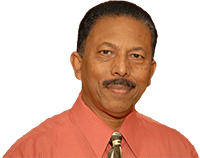
WHEN my friend Jacob Panicker invited me to join him for a morning walk, what interested me was the opportunity to take pictures of the life-size statues of Swami Vivekananda and Annie Mascarene that Vice-President Hamid Ansari unveiled a couple of days earlier. Panicker stays in a fashionable, landmark apartment complex at Kuravankonam in the state capital. How did the place get the name Kuravankonam, which literally means a piece of cloth that Kuravan (a Dalit) uses to cover his nudity?
Panicker had no clear answer to this etymological question. A few hundred metres away from his house, across the same road, is ‘Mummy’s Colony’. If the nation can have a father, why can’t a colony have a mother, I thought. When I posted a comment on the colony on my Facebook Timeline, my friend and the late Vicar-General C.G. David’s daughter Darlena David threw light on the Mummy, who was her mother’s cousin. The Mummy had a brother, MP John, who used to publish a philosophical journal New Times Observer from Pondicherry.
It is by way of association that we remember many things. For Panicker, Mummy’s Colony is where the celebrated former bureaucrat and Bible scholar D. Babu Paul lives. When I heard his name, I decided to meet him in the hope that he had forgiven, if not forgotten, me for a column in which I had criticized him about 12 years ago. We thought of seeking an appointment with him later in the day.
The first person we accosted in the colony turned out to be his caretaker. “Sir is in meditation. He will be available only after 10.30 am,” he said. The nameplate clearly said “Cheerathottam (Garden of Spinach) Babu Paul, IAS”. He gave me his mobile number and that is how I reached there again at the appointed time.
We opened the gate and entered the compound. What struck my attention was a note in Malayalam hanging from the wall: “No need to ring the bell. For the Netranarayan, the temple bell is useless. The one inside sees everything. The one outside just has to wait”. From there, we could see Babu Paul engrossed in reading in his study. “Please come inside”. He sat behind a large table littered with notebooks, a pile of back issues of the Economist, gadgets like a mobile, an iPad and a Kindle with a shelf of books, mostly religious, behind him.
“After my wife’s death, I decided not to have too much of privacy. That is why I have this transparent door. The note you were reading is a recent one. I had another one which said, “Please wait for my arrival which is certain like Jesus’ second coming.” Bishop Chrysostom found the note so amusing that he took it away to be displayed at his office. “Many people think that I am the Netranarayan mentioned in the note. No, Netranarayan is the one who has seen Lord Vishnu with his own eyes. When such a person visits a temple, the deity recognizes him instantly.”
Suddenly a telephone call distracts him. A city councillor wants to know why second Saturday, not the first or the third or the fourth Saturday, is a government holiday. “I do not have a clear answer but my guess is that since the second Saturday comes in the middle of the month, the government feels the employees can have an extra holiday,” I heard him tell the caller. “Knowledge nowadays means knowledge about the right source to get knowledge. The councillor thought that I being an ex-bureaucrat could enlighten him on the subject”.
Distraction does not come alone. It comes in a procession. This time it came in the form of a money order. The postman handed him a small amount with a printed note from the sender, ‘Onakaineetam’ (an offering on Onam). “This is how a small publisher acknowledges my contribution to his journal”. Babu Paul runs a weekly column in the newspaper Madhyamam, which touts itself as India’s first international newspaper. “I have been writing this column for the last 10 years, the longest for a non-journalist in the state”. He has just finished writing a book tentatively titled Francis Veendum Varunnu (Francis comes again) on Pope Francis. The title reminded me of Nikos Kazantzakis’ God’s Pauper: St. Francis of Assisi.
As he read out a list of books on the Pope and the Papacy, most of which he read on his Kindle device, I remembered listening to him discussing the election of the new Pope on a television channel. I realised that he was keenly following all the developments at the Vatican, though he was a Jacobite, not a Catholic. He is an unabashed admirer of the Pope: “There were bishops who travelled in public transport, washed the feet of women on Good Friday and spoke in the common man’s idiom but he is the first Pope to have done all this”.
Babu Paul attributes many of the good lessons he learnt in life to his father Rt. Rev P.A. Paulose Corepiscopa and his mother Mariamma, whose portraits constantly gaze at him from the wall in his study. He gave me a copy of the book ‘Athyunnathante Nizhalil’ (In the Shadow of the Most High), brought out on the occasion of the sacerdotal golden jubilee of the priest in 1979. One of the contributors of the book describes his parents as Vashishta-Arundhati-like.
“There is a custom among Tamil Brahmins under which a newly-married couple should see the Vashishta-Arundhati stars together”. It is believed that there are seven stars revolving around the Sun. They represent seven Maharshis. The biggest of them is Vashishta, which has beside it a smaller star called Arundhati. It may or may not be visible but they are always together. Babu Paul’s parents were like the celestial couple, says the writer, Fr C.T. Kuriakose. What a compliment, I thought.
Babu Paul has a brother, Roy Paul, who belonged to the Bihar cadre of the IAS. We used to share notes on public issues and personalities when we were in Patna. After retiring from the civil service as Secretary, Civil Aviation-cum-Chairman, Air India, he had a full term as Member, UPSC. Unlike his younger brother who leads a quiet retired life at Kottayam, Babu Paul is busy as a writer and public speaker.
“On an average, I spend five days a month travelling and speaking.” I was curious to know how he managed his travels. “Anyone who invites me to a function is told to pay for my travel, which my driver collects. My car has been improvised to let me sleep comfortably. Before I close my eyes, I imagine Jesus at the steering wheel. That takes away all my worries”.
He gave me an advice: “When you travel, it is better to close your eyes for it frees your eyes from constantly changing their focus. It will keep you fresh”. He had an explanation for why he did not like train travel. “When I am at a railway station, many people recognize me. That boosts my ego, which is sinful. When I sleep in my car with the curtains drawn, nobody sees me. That is the philosophical explanation. The more mundane explanation is that I hate climbing stairs, which is unavoidable at railway stations”. Though he is a public person, loneliness is his constant companion.
He has two children, a son who is a senior executive with Bacardi, a wine company, in Bangalore and a daughter who lives at Ernakulam but has a house across the road. “When my daughter is here, my food comes from her home. Otherwise, it comes from a club. The lunch is split and stored for dinner”. Babu Paul is a skilled raconteur of service stories. His book containing some of these stories had several editions. He had his ups and downs in his bureaucratic career, where he became a byword for honesty and integrity.
He salutes three rulers for their administrative and visionary acumen. They are Swati Thirunal, who set up the Astronomical Observatory, the Government Press, the Public Library and the Oriental Manuscript Library, Sir CP Ramaswamy Iyer, who issued the Temple Entry Proclamation, abolished capital punishment, introduced universal adult franchise and the mid-day meal scheme in Travancore and C. Achutha Menon, who set up several institutions including the Sree Chitra Thirunal Institute of Medical Sciences and Technology and introduced the one lakh-house scheme.
He has fond memories of Menon who entrusted him with the responsibility of setting up Idukki district as its first Collector with office at Kottayam. “Menon would disappear from the secretariat on Friday afternoon to appear only on Monday morning with clear instructions to the Chief Secretary to disturb him only in the event of Lord Parasuram returning to push Kerala back into the Arabian Sea. He used the weekends to catch up on his reading”. His admiration for Menon also stems from the fact that he was a school and university topper.
Babu Paul mentioned in one of his columns that he had prepared his “funeral speech”, which would be delivered only after his death. When the Malayala Manorama mentioned it in his weekly quotes column, it amused newspaper readers in the state. He played the introductory remarks in the speech for my benefit.
He has also prepared a wish list that included: 1. He should not be put on the ventilator except for a few hours to resuscitate him, if necessary. 2. His body should be buried as soon as possible but not later than 24 hours 3. Nobody should kiss the body. 4. If anybody is abroad or traveling for work, he or she should continue his or her work and not return for the burial. 5. There should be no firing in the air if he is given a state funeral, a honour given to writers in Kerala. “I don’t know why policemen fire in the air. It may hit my soul going up”. He has his own reasons to abjure practices commonly associated with funerals. “It has become fashionable to keep the body in a morgue for a few days even if all family members are around”.
One person he venerates is Mother Teresa. I never allowed anyone to sit on the chair she used when she visited my house. It was kept apart with a picture of the Mother on it. “After she was beatified, I began using the chair as my altar”. As he said this, I could imagine him sitting in meditation before the chair. The biggest picture in the house was, however, a life-size painting of Nirmala, his wife.
Vanity is what Babu Paul hates the most. He showed me a photograph, where he is with Queen Elizabeth. “I presented her a book “Queen’s Story” and she asked me, “Is it about me?” I could hear a little sound outside. Someone had brought his lunch and kept it on a chair in the verandah. “I believe in home deliveries, may be because my mother delivered me at home. Even when I bought a car, I asked the dealer to deliver it at home. I survive on home deliveries”.
When his brother bought a flat in Kottayam, he invited Babu Paul also to shift to the town. “Achayans (Christian men) in Kottayam respect only two kinds of people — those who have lots of money and those who have power. Since I do not have either of them, I politely declined his invitation,” said Babu Paul who lives from deadline to deadline.
It was nearly two and a half hours since we reached his home and time just flew. As we took leave of him, he invited us to come again. “My house will always be open for you”. In his Apostolic Blessings on the commemoration of his father’s Sacerdotal Golden Jubilee, the Syrian Patriarchate of Antioch and All the East, Ignatius Yacoub III, mentioned Babu Paul and Roy Paul and said, “From many sources we hear about their spiritual activities towards the growth of God’s church. In this context we remember the words of our Lord, “Every good tree bringeth forth good fruits”. The Patriarch could not have said it better.
The writer can be reached at ajphilip@gmail.com and followed at ajphilip53@twitter.com
>>> Read PDF Version.....




Comments





